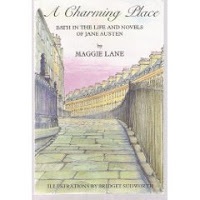 Jane Austen did not invent Colin Firth.
Jane Austen did not invent Colin Firth.
Shocking, but true.
I’ve been trying to work out for years the real relationship between Austen and romance novels of the early twenty-first century. She was not, sigh, “the first writer of Regency romances.” She wrote contemporary novels.
She wrote about marriage for love in a society where everything had its price, but the majority of established married couples in her books are mismatched. Her characters, middling gentry, would mostly do better with a little more money in their lives, and very few of her hero/heroine matches face abject poverty or marry across class lines–there’s always that living to be had with the comfortable income, or he’s stinking rich (Darcy). After all, she said a large income is the best recipe for happiness I ever heard of.
And that’s the trouble with Jane Austen, or at least, quoting her. She is a mistress of irony and subtext which is why she’s read 200 years later and we still haven’t figured her or her books out. What did she really think? Was she Marianne or Elinor or Lizzie or any, or all of her heroines? When does the real Jane Austen speak in her novels? Or in her letters, for that matter, full of all that determined chatter of acquaintances and fashion and social events, knowing that although she might write to Cassandra, her letters were public property to be shared with other family members.
Imagine you’re at one of those country gatherings in Hampshire. Miss Jane Austen is in attendance with her sister Cassandra, the pretty one who would have married if the young man to whom she was engaged had lived. Miss Jane, though, is a bit of a mystery. She has the reputation of having been a dreadful flirt, she’s quite good-looking, well-read despite a somewhat patchy education, and is well if modestly dressed. There have been rumors of love affairs, and an inexplicably short engagement to a man five years her junior but exceedingly wealthy. Her family is well-connected, handsome, and clever.
Her glance over the rim of her wine glass rakes over you. She knows the price of every trim on your gown and the price of the fabric, too, having patronized the same shops in Basingstoke or Portsmouth or Winchester. You thought you could get away with a bit of reworking of your gown, hiding the panel your maid scorched with a too-hot iron, but she notices. She’s done the same herself.
You’d like to make her acquaintance, but of course you must wait to be introduced. You’re flattered by her interest, but something about that piercing hazel gaze makes you uncomfortable, and you wish she’d turn her attention elsewhere. It’s as though she is taking notes. She leans toward her sister and murmurs something in her ear and they both laugh…
So if purists gasp in shock and horror at monster mash books that have zombies in Meryton, sea monsters among the Dashwoods, TV adaptations full of sex and wet shirts, or even Austen as a vampire, I wouldn’t worry too much about it. She’s a tough girl. She can take it and so can her books.
Happy 234th birthday, Miss Austen.
Question: Do you think you would you have liked Jane Austen? And if you met her, what would you ask her?
Chat away for a chance to win a prize…










